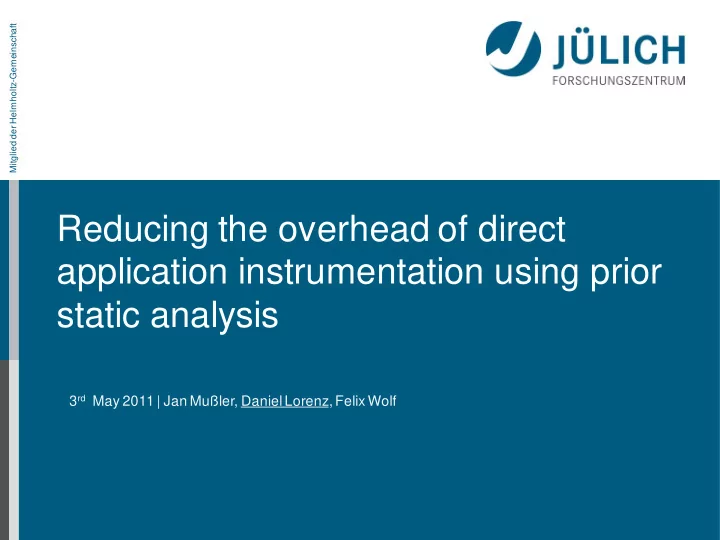

Mitglied der Helmholtz-Gemeinschaft Reducing the overhead of direct application instrumentation using prior static analysis 3 rd May 2011 | Jan Mußler, Daniel Lorenz, Felix Wolf
Overview • Performance analysis with Scalasca • Filtering • Motivation • Code structure based filters • Configurable binary instrumenter • Evaluation • Future plans 5. Mai 2011 Folie 2
Event-based performance analysis - Instrument e.g. enter and exit points of functions - Instrumentation is mostly done automatically by tools - Most tools instrument every function - Record performance data on events 5. Mai 2011 Folie 3
Cube display 5. Mai 2011 Folie 4
Overhead • Inserting calls to a measurement system inserts overhead • Runtime overhead grows with density of events • Traces can grow large • For many functions, enter/exit events are not needed for targeted analysis • E.g., communication analysis requires only call-path to MPI functions • Target: Reduce overhead by excluding less relevant functions from instrumentation 5. Mai 2011 Folie 5
Filtering • Existing tool provide blacklist/whitelist approaches • Name-based filters are application dependent • Require several test runs to create appropriate filters • Idea: Usage of code structure metrics provides application independent criteria • Criteria depend on analysis goal 5. Mai 2011 Folie 6
Filter criteria • Approaches for communication analysis: • MPI functions and functions on a call path to MPI functions • May not be sufficient to pinpoint the source of computational imbalance that causes communication delays • Tradeoff between overhead reduction and information loss • Try to avoid frequently called small functions • High overhead • Need access to code structure 5. Mai 2011 Folie 7
Configurable Binary Instrumenter (Cobi) • Dyninst provides easy access to code structure • Developed a binary instrumenter • uses the Dyninst binary rewriting features for instrumentation • Uses the information provided by Dyninst to apply filter rules • The inserted code can be configured by tool developers • The filters can be specified by the user based on a set of code structure criterias and name matching patterns 5. Mai 2011 Folie 8
Cobi – instrumentation configuration • XML file which specifies the code snippets inserted at instrumentation points • Subset of C • Provided by the tool developer • Can instrument functions and loops • Definable points are: Before, enter, exit, after, initialize, finalize • Specify additional shared libraries to be linked against the executable • Special context variables: E.g., @ROUTINE@ 5. Mai 2011 Folie 9
Instrumentation example <adapter> <dependencies> <library name=“mlib.so” /> </dependencies> <code name=“functions”> <enter> enterFunc(@ROUTINE@, @FILE@); </enter> <exit> exitFunc(@ROUTINE@, @LINE@); </exit> </code> </adapter> 5. Mai 2011 Folie 10
Cobi - filters • Are specified in a separate XML file • Start with all or no function • Include/exclude functions with filter rules • Possible rules are: • Are on call path • Depth in call tree • • Lines of source code Name matching • • Cyclomatic complexity Prefix • • Number of instructions Suffix • Number and nesting level of loops • Number of function calls • Rules can be combined by logical operators 5. Mai 2011 Folie 11
Filter example <filter name=“mpicallpath” instrument=“functions=functions” start=“none”> <include> <property name=“path”> <functionnames match=“prefix”> MPI mpi </functionnames> </property> </include> </filter> 5. Mai 2011 Folie 12
Costs of binary instrumentation • Instrumented empty function with enter/exit calls to the Scalasca measurement system • 1,000,000 executions in a loop • Scalasca uses floating point registers • Need to save floating point registers on every event instrumentation method runtime / s no instrumentation 0.02 compiler instrumentation 0.67 Cobi w/o saving floating point register 1.26 Cobi with saving floating point registers 2.61 5. Mai 2011 Folie 13
Evaluation method • Apply filter to real world applications • MPI 2007 SPEC benchmarks • Cactus Carpet • Gadget • Filters • MPI callpath • Lines of Code 5+ • Cyclomatic complexity 2+ • Cyclomatic complexity 3+ • Measure runtime and fraction of instrumented functions 5. Mai 2011 Folie 14
Technical environment • Applications were compiled with gcc 4.3.4 • Patched Dyninst 6.1 • Patches are included in Dyninst 7 • Instrumented test applications with Cobi • Measured with Scalasca 1.3.2 • Runs on Juropa with 32 ranks • Except RAxML ran on 64 ranks 5. Mai 2011 Folie 15
Instrumented fraction of functions with filters 100,00 90,00 80,00 70,00 60,00 50,00 40,00 CC2+ % 30,00 CC3+ % 20,00 LoC5+ % 10,00 MPI path % 0,00 5. Mai 2011 Folie 16
Runtime overhead in percent 1460 1023 1046 1143 336 123 196 34 61 53 40 30,00 25,00 20,00 15,00 Full CC2+ 10,00 CC3+ 5,00 LoC5+ MPI path 0,00 -5,00 5. Mai 2011 Folie 17
Conclusions • MPI path is most aggressive and results in least overhead • In most cases MPI path and CC3+ result in reasonable overhead • In case of Gadget, CC3+ instruments much more functions than LoC5+, but has lower runtime overead • More accurate selection of overhead prone functions 5. Mai 2011 Folie 18
Future plans with Cobi • Want to distribute Cobi as a separate package • Coming soon • Need reliable detection of all entry/exit points for a function • In future versions of the measurement system • Want to support Cobi as an experimental feature 5. Mai 2011 Folie 19
Recommend
More recommend